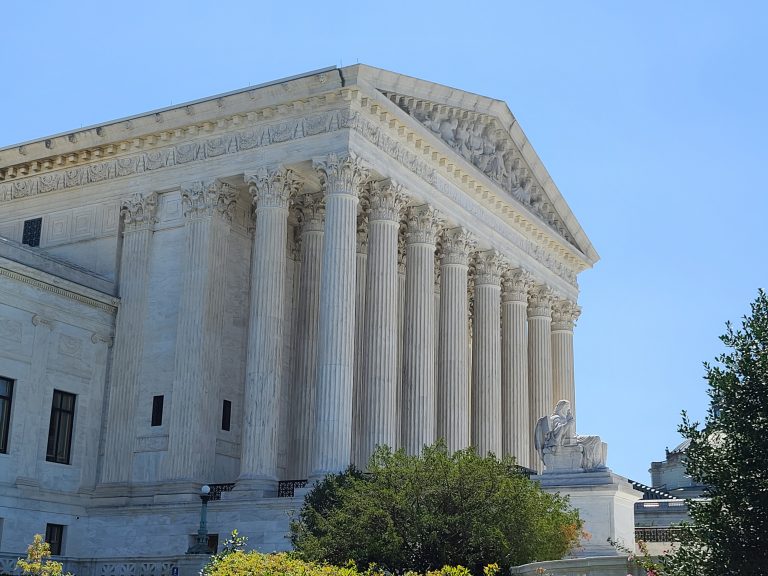A federal appeals court has found disarming people under domestic violence restraining orders unconstitutional, setting up a showdown at the Supreme Court. How will the justices react?
A three-judge panel of the Fifth Circuit unanimously vacated a Texas man’s conviction for possessing a gun while under a restraining order. They applied the standard the High Court handed down in New York State Rifle and Pistol Association v. Bruen and determined there was no historical analogue that matched the modern law’s purpose or methods.
“The Government fails to demonstrate that § 922(g)(8) ‘s restriction of the Second Amendment right fits within our Nation’s historical tradition of firearm regulation. The Government’s proffered analogues falter under one or both of the metrics the Supreme Court articulated in Bruen as the baseline for measuring ‘relevantly similar’ analogues: ‘how and why the regulations burden a law-abiding citizen’s right to armed self-defense,'” Judge Cory T. Wilson wrote for the panel in United States v. Rahimi. “As a result, § 922(g)(8) falls outside the class of firearm regulations countenanced by the Second Amendment.”
The ruling sets up a situation where a federal gun law is no longer in effect for Texas and Louisiana. The Department of Justice is unlikely to let that stand for long without asking the Supreme Court to intervene. And the Court tends to take the government’s appeals over everyone else.
I can see only two mitigating factors that might slow the case’s assent. The first is that there is still one more level of review available in the Fifth Circuit, specifically an en banc hearing in front of the entire court. The second is that a circuit split now exists on this issue, but the Fifth Circuit is the only appeals court to have heard a case on this issue in the wake of the Bruen decision.
So, as with the New York gun-carry cases, the Supreme Court may want to see the case develop more before it agrees to get involved. They may want to see how other circuits grapple with domestic violence restraining orders and the Second Amendment so they have a better idea of what different approaches might look like.
Still, the case is now one of the most likely Second Amendment fights to end up in front of the Court next. And it’s not the fight gun-rights groups have been angling for up to now. No gun-rights group was involved in the case since they are far more focused on things like “assault weapons” bans or gun-carry restrictions.
But the Bruen standard, of course, applies to thousands upon thousands of individual criminal cases that implicate the Second Amendment just as much as it does to the dozens of cases coming out of organized gun-rights efforts. So, it should come as no surprise important cases will develop this way.
There are good reasons why gun-rights groups likely didn’t pursue knocking down this law as a top priority. For one, restrictions on people who have committed domestic violence are very popular. And for good reason, given offenders often re-offend or even escalate their violence.
The Bruen standard explicitly forbids the sort of interest balancing that considers a gun law’s popularity or social effect. So, these facts shouldn’t have an impact–which the Fifth Circuit mentions in its ruling. However, it’s important to recognize the Supreme Court has been pretty far behind the movement of public opinion to this point.
Heller recognized that the Second Amendment protected handgun ownership well after significant political will to ban them had dried up outside of Washington, D.C., and Chicago, Illinois. Bruen recognized the right to carry a concealed gun after the entire country, save eight states, had already moved from banning it outright to removing all permitting requirements or requiring the government to issue permits to all qualified applicants.
Additionally, the Supreme Court has made numerous non-binding comments implying it thinks wide swaths of federal gun laws are constitutional without explaining how they fit with the American tradition of gun regulation.
In Heller, the Court said its ruling didn’t implicate the federal ban on machineguns or felon-in-possession crimes even though those laws are 20th Century creations. In Bruen, Justices Bret Kavanaugh and John Roberts reiterated that point in their concurrence.
Will all of the justices who joined the Bruen majority be willing to throw out the domestic violence restraining order gun ban, especially when there are some historical laws that could more honestly be viewed as analogues than is the case with other modern restrictions?
To this point, federal judges inclined to uphold modern gun restrictions have taken one of two paths. They’ve either argued the laws affect devices, such as ammunition magazines, which fall outside the protections at the core of the Second Amendment, or they’ve taken a very broad view of what constitutes a historical analogue. Often, as in the case against Oregon’s Measure 114, they take both approaches.
“Plaintiffs have not shown that the magazines restricted by Measure 114 are necessary to the use of firearms for lawful purposes such as self-defense,” U.S. District Judge Karin Immergut wrote. “Therefore, Plaintiffs have failed to show that magazines capable of accepting more than ten rounds of ammunition are covered by the plain text of the Second Amendment.”
“In considering whether Defendants are comparably justified in imposing Measure 114 as were this Nation’s earlier legislatures in imposing historical regulations, this Court finds that it may consider the public safety concerns of today,” Immergut continued. “In light of the evidence of the rise in mass shooting incidents and the connection between mass shooting incidents and large-capacity magazines—and absent evidence to the contrary regarding the role of large-capacity magazines for self-defense—Defendants are comparably justified in regulating large-capacity magazines to protect the public.”
The Fifth Circuit rejected these sorts of machinations. Instead, it focused on whether the goal of the modern restriction and historical laws offered up as potential matches sought to solve the same problem through the same means. They found none of the examples were relevantly similar, but one was at least closer than the others.
They determined bans on “dangerous” groups, including some bigoted laws, weren’t close because, even though they disarmed targets of the law, they were meant to prevent general threats to the peace instead of specific threats to individuals. For founding-era bans on “going armed to the terror of the people,” they said the difference laid in the requirement for a criminal conviction and the punishment being less severe–a loss of the ability to carry in public than a ban on all gun ownership.
Surety laws, which required those accused of being dangerous to post money to continue carrying guns in public, were a closer fit than the others. But the Fifth Circuit found the way they were enforced was too different.
“The surety laws required only a civil proceeding, not a criminal conviction,” the panel said. “The ‘credible threat’ finding required to trigger § 922(g)(8)‘s prohibition on possession of weapons echoes the showing that was required to justify posting of surety to avoid forfeiture. But that is where the analogy breaks down: As the Government acknowledges, historical surety laws did not prohibit public carry, much less possession of weapons, so long as the offender posted surety.”
The Fifth Circuit’s conclusion is difficult to disagree with. Surety laws were closer to posting a bond, and failure to comply resulted in the loss of the right to carry instead of the loss of all Second Amendment rights.
Additionally, a restraining order isn’t a criminal conviction (the man at the center of this case is already facing five separate criminal cases that will likely end with his gun rights being stripped anyway). That was a key point in the Fifth Circuit’s analysis of the laws offered up as historical analogues, as it was for the district judge who ruled the federal law against those under felony indictment obtaining guns was unconstitutional under Bruen. The Supreme Court may see that distinction as paramount in how it views the case as well.
It’s also possible five justices determine those laws are a closer match than the Fifth Circuit panel believes. Or there could be another historical law out there they believe to be a better fit.
Of the cases likely to end up in front of the Court sooner than later, the outcome of this one is the hardest to predict.






